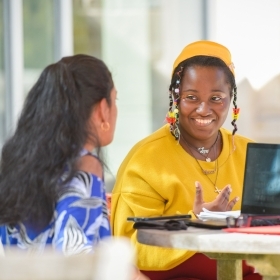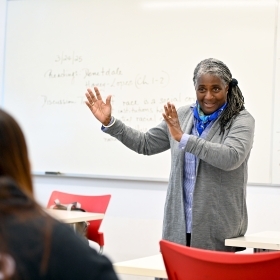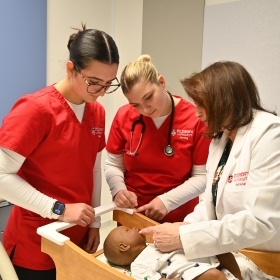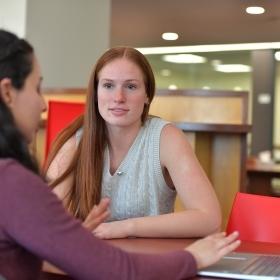Importance of Voting in 2024: Why It Should Top Your College To-Do List

Navigating elections as a young adult can feel overwhelming. From staying informed about candidates and policies to managing election-related stress, it can be a lot to handle.
In this guide, we explore the importance of voting and how your voice can shape the future. We discuss the significant challenges students encounter during the election season and provide practical tips to help you stay informed, calm, and prepared when it’s time to vote.
I. Why is Your Vote Important?
It’s easy to feel like your vote doesn’t matter. But here’s the truth: even a few votes can decide elections, especially at the local level.
Brian Browne, Associate Vice President of University Communications and Public Affairs and Adjunct Professor in the Department of Government and Politics, emphasizes, “Fifty-three years ago, the 26th Amendment lowered the voting age from 21 to 18, granting young voters a critical voice in shaping our nation’s future."
Young voters compose nearly one-fifth of the electorate. With 16 million Americans having their first opportunity to vote in the next presidential election, the potential for young people to influence key races is significant.
Mr. Browne points out that, “In addition to the presidential race, with 33 US Senate seats and all 435 US House of Representatives seats up for election in 2024, young voters have the power to sway the results.”
The Impact of Voting on Student Life
Many young voters feel disconnected from politics—57 percent of those aged 18–24 are dissatisfied with American democracy, and 33 percent don’t plan to vote in the next presidential election. But did you know your vote directly impacts policies that affect your life as a student—like education, housing, job opportunities, and public transportation?
For example, political leaders elected to office shape college tuition costs and funding for higher education. Policies around minimum wage, job creation, and affordable housing often hinge on local and national election results. According to the Center for Information & Research on Civic Learning and Engagement, approximately 50 percent of people aged 18–29 and 66 percent of college students voted in the 2020 presidential election. These numbers reflect the growing importance of young voters in deciding the nation’s future.
Yet, enthusiasm for voting among young people is waning. As Mr. Browne notes, “Recent polls have identified an enthusiasm gap among young voters entering the 2024 elections, with fewer expected to cast votes compared to 2020.”
This is where education becomes critical. He stresses, “When young people are encouraged to vote and taught how to register in school, it has a compounding effect.” Voting is habit-forming, and starting early can set a lifelong pattern of civic engagement.
II. Understanding Misinformation on Social Media
In an age where misinformation and “fake news” can quickly spread through social media, becoming an active consumer of political information is more critical than ever. A recent study from Deep Media AI found that 38.2 percent of US news consumers unknowingly share fake news. But how can you protect yourself from being misled and ensure you get accurate information?
According to Elisabeth Fondren, Ph.D., Associate Professor of Journalism, Division of Mass Communication, at St. John’s University and researcher in propaganda, understanding the difference between credible journalism and political messaging is vital.
“Remember that most journalists want to inform, but most political influencers want to sell a message or promote a candidate,” she explains. “This means students must critically assess the intention behind the content they consume.”
Proven Tips to Develop Positive Media Consumption Habits
Develop a “News Diet.”
One of the biggest challenges is confirmation bias—people only engage with sources that align with their beliefs. “When you’re only exposed to sources that feel completely agreeable or comforting, you might only hear one side of an issue,” Dr. Fondren warns.
She advises students to seek contrasting opinions and ensure their information comes from credible sources. “I think students could make it a habit to seek out a wide range of sources: news articles, opinion pieces, and international perspectives. In my classes, I call this a ‘news diet’—and that diet should be wholesome and prioritize factual and ‘quality’ or well-sourced information.”
Practice Lateral Reading.
To avoid falling for misinformation, Dr. Fondren also recommends reading news on larger screens, such as laptops, rather than phones, to engage with the material thoroughly. “Research suggests people learn less about politics when reading on their phones,” she explains. By practicing lateral reading—comparing coverage from several news outlets—you can better understand political events from different perspectives and avoid misinformation traps.
Here are some additional tips to help you find unbiased political candidate information:
- Websites like Ballotpedia and Vote.org offer unbiased information about candidates, policies, and voting logistics. These platforms are trusted and provide factual data without leaning toward political bias.
- Before believing or sharing election-related information, especially on social media, use fact-checking websites like FactCheck.org or PolitiFact to verify accuracy.
Dr. Fondren Discusses 'Fake News' on St. John's University Podcast: Conversations with the Creators
Listen to the full episode now and stay informed.
III. Prepare for Election Day: How College Students Can Register and Vote
The voting process might seem incredibly confusing if you’re a first-time voter. But don’t worry—getting registered and ready to vote is easier than it looks. Follow these steps to ensure registration success:
Step 1: Register to Vote Online.
The first step is registering to vote; this can be done online in many states. Visit Vote.org’s Online Voter Registration to check your state’s requirements and register in just a few minutes. If your state doesn’t offer online registration, this site will guide you through completing a paper registration.
Important Deadlines for the November 5 General Election
Mail Registration
Applications must be received by your board of elections no later than October 26, 2024, to be eligible to vote.
In-Person Registration
-Register at your local board of elections or any participating state agency on any business day.
-Your application must be received by October 26, 2024, to vote in the General Election.
Step 2: Decide Where to Register.
As a college student, you can register either in your home state or the state where you attend school. Choose the state that feels most relevant to you, whether because of local policies or ease of access to a polling location. For more information on where to vote, check out this helpful guide on vote.gov.
Step 3: Get an Absentee Ballot if You Are an Out-of-State Student.
If you’re studying out-of-state, but want to vote in your home state, you must request an absentee ballot. Every state has different rules for absentee voting, so visit Vote.org’s Absentee Ballot Guide to learn how to request your absentee ballot and the deadlines you need to meet.
Step 4: Know Your Deadlines.
Each state has different deadlines for voter registration and absentee ballot requests. To find your state’s specific deadlines, use Vote.org’s Election Deadlines Tool.
Step 5: Find Your Polling Place or Submit Your Ballot.
If you plan to vote in person, you can find your polling place using Vote.org’s Polling Place Locator. If you vote by absentee ballot, ensure you send it in by the required deadline and track your ballot to confirm it has been received.
IV. Managing Election Stress
Feeling anxious about the election is normal. Whether it’s the buildup to Election Day or uncertainty afterward, the pressure can be overwhelming. Here are some practical tips to help you manage election stress:
- Take Breaks from Social Media and News: Schedule times to unplug from the news and social media to give your mind a break.
- Practice Mindfulness or Engage in Relaxing Activities: Mindfulness exercises like deep breathing, meditation, or even a walk outdoors can help you stay grounded. Engaging in activities that bring you joy, such as reading or spending time with friends, can also reduce anxiety.
- Prepare for Any Outcome: Elections are a part of a larger democratic process, and change happens over time. Regardless of the results, know that your participation was meaningful.
St. John’s Mental Health and Wellness Resources
Your Vote Counts: Here’s How to Take Action.
Your vote is a powerful tool for making your voice heard and influencing meaningful change. If you haven’t already, now is the time to get involved in the voting process and prepare for Election Day.








